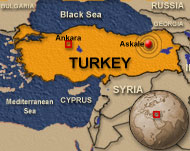Turkey seeks alternative energy sources
With a booming population and a growing economy, energy hungry Turkey has been turning recently to more novel ways of generating power.

Backed by the World Bank, it has now decided to join a half billion dollar investment project in the wind and the waves.
“Turkey is unique amongst other European countries in having an abundant endowment of renewable energy resources,” says Andrew Vorkink, the World Bank’s Country Director for Turkey.
“Its unexploited hydro resources alone could provide an equivalent amount of electricity capacity as installed today,” he adds.
With Turkey dependent on imported energy sources for up to 70% of its requirements, Ankara has long looked to develop domestic power.
About 30% of its electricity needs are met by an extensive – and controversial – network of dams and coal and gas-fired power stations.
However, dams have a limited life, Turkey’s coal is generally of poor quality and the gas has to be imported. Hence, the increasing need to develop alternatives.
|
“Turkey is unique amongst other European countries in having an abundant endowment of renewable energy resources” |
With more than 8000km of coastline, and many of its coastal regions enjoying constant breezes, Turkey appears to be a natural candidate for renewable energy projects.
Now, both the private Turkish Industrial Development Bank and the state-owned Turkish Development Bank are to make loans available to qualified private sponsors of renewable energy generation projects.
The World Bank’s involvement comes through a loan, providing supplementary sponsor equity, commercial loans and export credits. In total, combined funding for renewable energy projects will total in excess of $500 million.
“We expect that this framework can provide the foundation to scale up renewable energy development in Turkey,” Vorkink says.
EU energy targets
Another facet of the project is that it will help Turkey’s efforts to bring itself into line with the European Union’s environmental and renewable energy targets.
The EU has set a target of 12% of member state’s energy needs being met by alternative sources by 2010.
|
“Turkey has the best potential for wind generated power in Europe. However, while the winds blow without being used, the Energy Ministry is blocking wind energy projects that could generate more than 2500 megawatts” Melda KeskinGreenpeace representative |
“This framework can channel other sources of grant and concessional funding from other donors, including the EU, for renewable energy resource development,” Vorkink adds.
Yet, while applauding the World Bank initiative, Melda Keskin, a representative of the environmental lobby group Greenpeace in Turkey, is somewhat sceptical of its prospects.
“Turkey has the best potential for wind generated power in Europe,” she says. “However, while the winds blow without being used, the Energy Ministry is blocking wind energy projects that could generate more than 2500 megawatts.”
Critics of the Turkish Energy Ministry such as Keskin point to a lack of progress made by its Energy Study Unit, which has so far confined itself to monitoring the country’s winds to locate potential sites for turbines by collating the output from the observatories of the Metrology Bureau.
Privatisation
Another factor is the Ministry’s long fascination with contracting agreements for imports, mainly for natural gas, to the exclusion of alternatives – especially alternative energy.
 |
|
Unlike some of its neighbours, |
While there are more than 20 wind farms currently operating in Turkey, another 12 projects have been cancelled, in part victims of World Bank and International Monetary Fund requirements that the Turkish state provide direct incentives and guarantees to pre-buy energy generated by private operations.
Meanwhile, despite its wave energy potential, there are no such projects currently active in Turkey.
In 2001, the Turkish government began privatising some of its electricity generating and distribution networks, and allowing for more private construction and ownership in the sector.
However, with the economic collapse of early 2002, investment dried up and the state had to take over some of the generating facilities it had sold off as owners defaulted.
Now, with the economy picking up, in part, kickstarted by the rigid measures enforced by the World Bank and the IMF, private sector investment is again beginning to flow.
Alternative energy campaigners are hoping that with the country having streamlined its investment regulations as well as suspended and launched investigations into many of the Energy Ministry’s former senior officials, the tide may be turning for the country’s alternative energy sector.